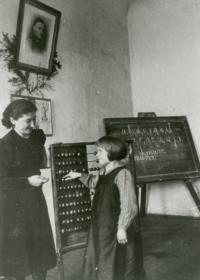My father used to say – Charity and social work should never be salaried You are a social worker or you are not

Stáhnout obrázek
She was born in 1907 in Radłowice (Sambor province, Lwowski district). Her father Julian Smulikowski was a member of Second Polish Republic Parliament and he acted in the Polish Teachers‘ Union as well. Her mother Maria was a teacher. Ewa Cichy had two brothers; Adam and Leszek. Ewa Cichy spent her childhood in Lviv and in 1914 she started her education in Maria Magdalena School there. When the 1st Word War started Ewa Cichy, together with her family and Marian Falski (author of popular polish primer book) evacuated to Viena where they stayed over a year. In 1915 they came back to Poland and resided in Oświęcim, in father’s sister house, but just for a short term. Afterwards the family reached Lviv and moved to the tenement house on Potockiego Street. Ewa Cichy attended Henryk Sienkiewicz School. She completed secondary school and two-year Educational Course after the war. When she got married she moved to her husband family house in Kurpie. She gave a birth to her son and her daughter. In 1930s together with her husband, her mother and brothers she moved to Warsaw because her mother got a position of the headmaster of the Polish and Jewish School at Okopowa 55. When the 2n Word War started Ewa Cichy’s mother organized secret education. Marian Cichy, Ewa’s husband worked in a Secret Service. Her two brothers died, taking part in the Underground Operation. The brother Leszek died during Mokotów siege. Ewa Cichy and her husband Marian Cichy were involved in the Underground Educational System and they used to arrang secret academic level degree lessons in a house on Praga, in Wilenska Street, where they lived. Ewa Cichy’s daughter was taking part in secrets lesson organized in Underwear School building. The family left for Lublin during the Warsaw Uprising, after its end they came back to Warsaw and stayed in the some house. After 1945 Ewa Cichy used to teach physic at school. She worked in the Cooks and Waiters School as well. She retired when she was 55 but continued doing some social works. She wrote down her own memories and memories about her friends. Ewa Cichy died in 2014.
